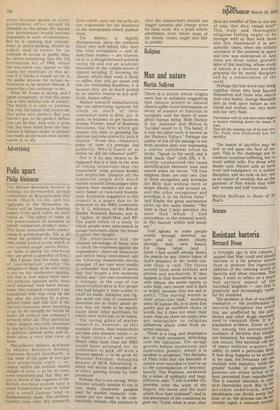Science
Resistant bacteria
Bernard Dixon
A fortnight ago in this column, I argued that Man could and should harness to a far greater extent
than at present the ingenious abilities of the teeming world of
bacteria and other microbes, This time, I want to reflect on a much less savoury aspect of the
microbial kingdom — one that is positively and increasingly harinful for mankind. The problem is that of microbial resistance — the proliferation Of, bacteria throughout the wor1.0 that are unaffected by the antibiotics and other drugs routinelY used to vanquish them. It is 1,1 population problem. Every so nt; ten, among the astronomicI numbers of bacteria that inhabit our intestines, for example, mutation occurs. One bacterial cell oui. of many millions acquires the ability to resist a particular drug,' If that drug happens to be arounu at the time, the fortunate cell can multiply with impunity, while the greater hordes of sensitive or: ganisms are either killed or a' least prevented from reproducing' This is natural selection in cla„.ssical Darwinian style. But in tn' ( microbial underworld, whips& inhabitants can divide every ha hour or so, the process can be eg: tremely rapid, a resistant mutan'
quickly outgrowing its competitors to achieve a position of dominance.
The dangers are obvious if the Mutant is an agent of disease. A typhoid fever bacillus, for example,
resistant to chloramphenicol (the antibiotic normally given to treat the disease), is a particularly perilous Prospect. The salmonella that causes food poisoning can create serious problems too, when it acquires drug resistance — particularly in very old and very Young people, for whom antibiotic treatment may well be essential. What is less clear at first sight is the danger that arises when entirely harmless bacteria become resistant to drugs. Why should it Matter if normal, innocuous gut inhabitants develop such insensitivity? The answer lies in the Phenomenon of transferable resistance — by which many intestinal bacteria, harmless and otherwise, can confer resistance on each Other. Brief contact between a resistant and a sensitive cell is enough to render the previously vulnerable organism capable of Withstanding the onslaughts of antibiotic attack. Thus a typhoid bacillus, formerly susceptible to antibiotics, can acquire resistance from the otherwise harmless bacteria in a person's gut. What would have been a treatable infection may thereby become one not amenable to chemotherapy.
Events of this sort, happening throughout the world in recent Years, have added greatly to the total 'pool' of resistance among our microbial foes. Clearly, Whenever antibiotics and similar drugs are employed to treat infections, there is a risk that resistant forms will emerge. But the chances of this happening are increased enormously when the drugs are used indiscriminately. Experts argue endlessly about Which practices are most blameworthy in this respect. There is no doubt, however, that major contributions come from the widespread but unnecessary use of antibiotics for trivial conditions; across-thecounter sales and self-medication, as happens in many countries; and the mass exploitation of antibiotics in farming to promote the growth of livestock.
In the current issue of the World Health Organisation's Weekly Epidemiological Record,, Professor E. S. Anderson blames the "prolonged and iMprudent use of antibiotics" for the appearance of drug-resistant organisms, and Presents figures illustrating that this is a world problem. In Guatemala recently 12,000 people died from dysentery due to resistant bacteria. Over 10,000 cases of typhoid have been caused by a resistant bacillus in an epidemic that is still raging.
Because bacteria are constantly being transferred from person to Person, and between humans and animals, and being ferried around the globe on an increasing scale because of modern air travel, methods of combatting the Menace must be international, not Merely national. There is little evidence of such responsible and co-ordinated action at present. In the agricultural use of antibiotics, for example, Britain has imposed relatively stringent regulations, and appears to have persuaded the other Common Market countries to do likewise. But elsewhere there are many examples of totally uncontrolled and sloppy dissemination of antibiotics on a wide scale.
The WHO is one of the most conspicuously successful UN agencies. It is some measure of the size of the drug resistance menace, therefore, that even this respected body has been unable to foster international agreements on defensive measures. Unable to forestall or combat the problem, the WHO has so far done little more than monitor and bewail its character and dimensions.
Bernard Dixon is Editor of New :Scientist and writes fortnightly in The Spectator.



































 Previous page
Previous page